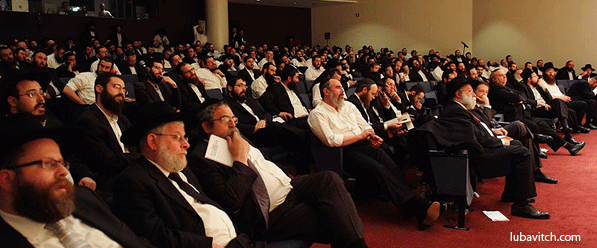(lubavitch.com) Some 350 Chabad rabbis from around the world came together last week for the Rohr Jewish Learning Institute conference held on the campus of the Polytechnic Institute of New York University in Downtown Brooklyn. Now in its 12th year, the annual conference is part of a two day forum that gives JLI-affiliated rabbis key resources for course planning and implementation for the upcoming year.
According to Rabbi Yisrael Rice, director of Chabad of Marin County, California, and a member of the JLI Executive Committee, the conference brings together “top level professionals from various fields to guide and inspire” participants.
Rice notes that the “conference has become the scene of nonstop sharing of ideas and teaching techniques.” Participating rabbis “return to their home bases reinvigorated” by the experience.
Rabbi Shmuel Friedman, who moved with his wife Rivkah to Beachwood, Ohio just last year, credits part of his excitement about the conference with cross-pollination of ideas between veteran JLI affiliates and those newly involved in adult education.
“I find myself sitting around the table listening to lecturers and rabbis I grew up admiring.” Friedman says. “The atmosphere of the conference helps underscore the truly global reach we have as affiliates.”
A central theme of this year’s conference was the importance of broadening the scope of people attending the JLI courses. In his opening remarks Rabbi Moshe Kotlarsky of Chabad-Lubavitch World Headquarters and chairman of JLI, noted that the conference coincided with 250 years since the passing of the founder of the Chasidic movement, the Ba’al Shem Tov.
“The Rohr Jewish Learning Institute,” says Kotlarsky, “has played a unique role in disseminating the teachings of Chasidic thought in a way that is both enticing and stimulating to an ever greater number of people from all walks of life.”
The Conference featured a presentation of JLI’s flagship courses for the coming year. The first of the three is Medicine and Morals, scheduled to begin this fall. The course offers a look at the moral and ethical dilemmas surrounding issues of health and end of life. The winter course is Towards a Meaningful Life, developed by author and lecturer, Rabbi Simon Jacobson, which focuses on empowering individuals with life skills and lessons drawn from the Torah. Spring 2011 will feature a course called Oasis in Time: The Gift of Shabbat in a 24/7, which examines ways in which Shabbat can be seen as a paradigm for spiritual balance in a culture where people often get caught up in extremes.
According to Dr. Chana Silberstein, Director of the JLI Curriculum, the common denominator of the three courses is the realization of the Torah as a spiritual anchor that can help people overcome and grow from the various vicissitudes of life.
“Where Medicine and Morals allows us to consider that all ethics are dramatically influenced by the mores of the society in which we live and that only the Torah remains a constant to accurately gauge morality, Towards a Meaningful Life and Oasis in Time play out the same theme in our daily relations with others and interaction with time itself.”
Other topics addressed included tried marketing tips from acclaimed sales consultant Jeff Goldberg and guidance from Dr. David Pelcovitz, professor of psychology at Yeshivah University, on how to properly address the sensitivity needed when discussing course material with those who may be personally dealing with the medical issues.
Rabbi Efraim Mintz, Executive Director of JLI, announced two new initiatives in a lateral growth plan to help better fulfill JLI’s mandate in advanced Torah study.
The first of the two, which will launch this fall, is a learning partnership with Touro College. The classes, which will be fully accredited by Touro College, will offer a blended learning system combining traditional “talk and chalk” classes in physical classrooms with an online component. Students enrolled in classes will thus be able to take full advantage of JLI’s worldwide network of affiliates while working towards a degree.
The second initiative will partner JLI affiliates with the Kohelet Foundation. Founded in 2008, the Kohelet foundation offers adult education classes through various partner programs for parents of children enrolled in Jewish day schools, thereby bridging the generational lines and creating a more holistic Jewish learning environment. In a program that will be piloted in 14 schools across three different regions in the United States, specially tailored JLI classes will be opened for Kohelet Foundation fellowship families.
Mr. George Rohr, the principal benefactor of the eponymous JLI, gave the closing address at this year’s conference.
Touching on his reason for backing JLI, Rohr noted that “I try to apply the same criteria that I use in business to everything that I do – checking the quality of the product, the drive and commitment of the operating partners, and the scalability of the project.”
While JLI was clearly ready on the first two levels, Rohr continued, there was some question as to whether or not a product of such high quality could be scaled to a much larger program.
Yet, as Mr. Rohr pointed out, JLI did, indeed, grow “extraordinarily” – something Rohr attributes to the quality of the program instructors and course content.
“It means a great deal to me,” Rohr concluded, “to be part of this magnificent enterprise, and I am excited by the opportunity for development in what is to come.”

Be the first to write a comment.